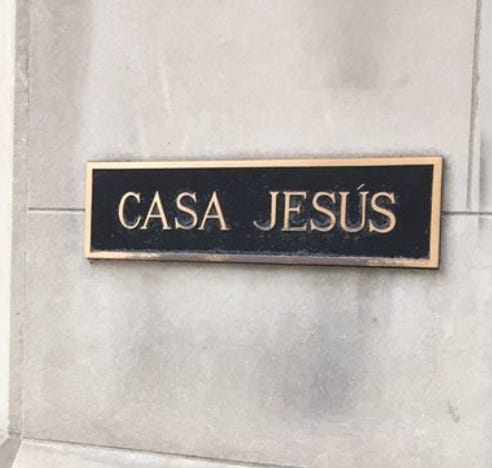Pillar subscribers can listen to this article here: The Pillar TL;DR
While a Florida woman will formally plead guilty Thursday to embezzling hundreds of thousands from the parish where she worked, a retired IRS investigator told The Pillar that implementing preventive internal controls could significantly reduce theft from Catholic parishes.
Heather Darrey, former finance manager at Christ the King Parish in Tampa, Florida, reached a plea agreement with federal prosecutors last month, agreeing to plead guilty to wire fraud after she was arrested May 20 on charges of stealing $775,000 from a parish operating account between October 2023 and March 2024.
Darrey is due in court June 6 to formally enter a guilty plea in the case.
The theft was aided, according to parish pastor Fr. Len Plazewski, by the construction of a new youth center, which saw large amounts of cash flow through parish operating accounts.
According to court documents, Darrey schemed to steal from the parish with a complex plan.
Charging documents say she routinely generated printed bank checks to parish vendors, got them signed at the parish, and then destroyed them, writing now handwritten checks in the same amount, but to herself, or to her creditors, including her mortgage lender.
Darrey would then input the original information into parish accounting software, making it appear that she had mailed the printed bank checks to the parish vendors.
A parish accountant detected Darrey’s activity in March 2024, and she admitted to stealing some money. She was fired, but she begged Plazewski not to contact police. But after an audit of the parish finances, the extent of Darrey’s theft — $775,196.90 — became clear. The parish, along with the Diocese of St. Petersburg, called law enforcement officials.
—
Darrey, who reached a plea bargain almost immediately after her arrest, could face up to 20 years in prison when she is sentenced for her crime.
But while she awaits sentencing, Robert Warren, a retired IRS investigator and professor of accounting at Radford University, said the case illustrates the importance of internal controls in parish and diocesan finances — and the need for dioceses to set clear standards and expectations.
Warren said the Tampa parish seemed especially to need more “preventative controls.”
“A good internal control environment consists of both preventive controls and detection controls,” he explained.
“Detection controls are designed to find the fraud after the fact — for example, reconciling bank accounts or taking an inventory of assets are standard detection controls. But a preventive control will prevent the fraud in the first place,” he said.
Warren emphasized the importance of including several people in financial transactions and record-keeping.
In general, Warren said, “the person who maintains the checkbook should not be the person in charge of maintaining the accounting records. This is called ‘separation of duties,’ and the theory is that the more people that need to be involved in a fraud to pull it off, the least likely it is that a fraud will occur. Because the more people who would need to be involved, the more likely someone would talk: As the old saying goes, three people can keep a secret as long as two of them are dead.”
“Christ the King Parish could have possibly prevented this embezzlement by having robust preventive controls through the separation of duties,” he speculated.
But at the parish, “Ms. Darrey received the invoice, wrote the check, and inputted the journal entry,” he said.
While the Church’s Code of Canon Law provides some norms regarding financial administration, most particular policies are left to the discretion of diocesan bishops. In the U.S., there is considerable variety among diocesan policies regarding parish accounting controls. While some dioceses mandate particular practices for theft prevention, others have relatively anemic particular law on the subject.”
In the Diocese of St. Petersburg, financial policies mandate that pastors must be signatories, but they do not seem to explicitly require that the checkbook holder not be responsible for parish bookkeeping and ledger entry.
The financial policy manual does indicate that pastors should “implement, monitor and administer systems with appropriate internal controls for the collection of funds and the disbursement of funds,” and requires that parishes submit to annual “internal control evaluations.”
The diocese also requires that “monthly bank reconciliations be performed for all bank accounts, by someone who is independent of recording cash transactions,” but in the case of Christ the King parish, those reconciliations did not immediately catch Darrey’s fraud — possibly because it took vendors time to pursue payment at the parish with someone other than Darrey herself.
Warren noted that it was inevitable Darrey would eventually get caught.
The parish employee “engaged in an almost Kamikaze-like fraud,” he said.
“Usually in parish thefts, the bookkeeper will set up shell companies and issue fictitious invoices. Ms. Darrey did not do this. Instead, she just diverted the payments for legitimate vendors. She must have known that at some point the vendors would call and complain and the jig would be up,” he said.
Warren speculated that the St. Petersburg diocese is likely to review its internal control norms, and provide more training for pastors, in the wake of Darrey’s arrest. He noted that theft from parishes — both by clerics and laity — is a well-documented phenomenon.
In fact, a different Florida woman, in another diocese, is currently on trial for charges that she stole more than $700,000 from the parish where she worked, Holy Cross Parish of Vero Beach.
—
While it is not yet clear when Darrey will be sentenced, Warren said he does not expect her to receive much prison time.
Warren noted the case of Brian Cansler, who in 2017 pled guilty to stealing more than $170,000 from the Catholic student center at the University of North Carolina-Chapel Hill, where he worked as finance director. Cansler was sentenced to 57 months incarceration, but served only 36 months.
He also noted the case of Deborah Marcellus, who in 2018 pled guilty to embezzling more than $800,000 from a parish in Rice Lake, Wisconsin. Marcellus was sentenced to 37 months in prison, but served only about 15 months before she was transferred to home confinement because of the Covid pandemic.
"If the past is prologue, Ms. Darrey will not spend too much time behind bars,” Warren predicted.




